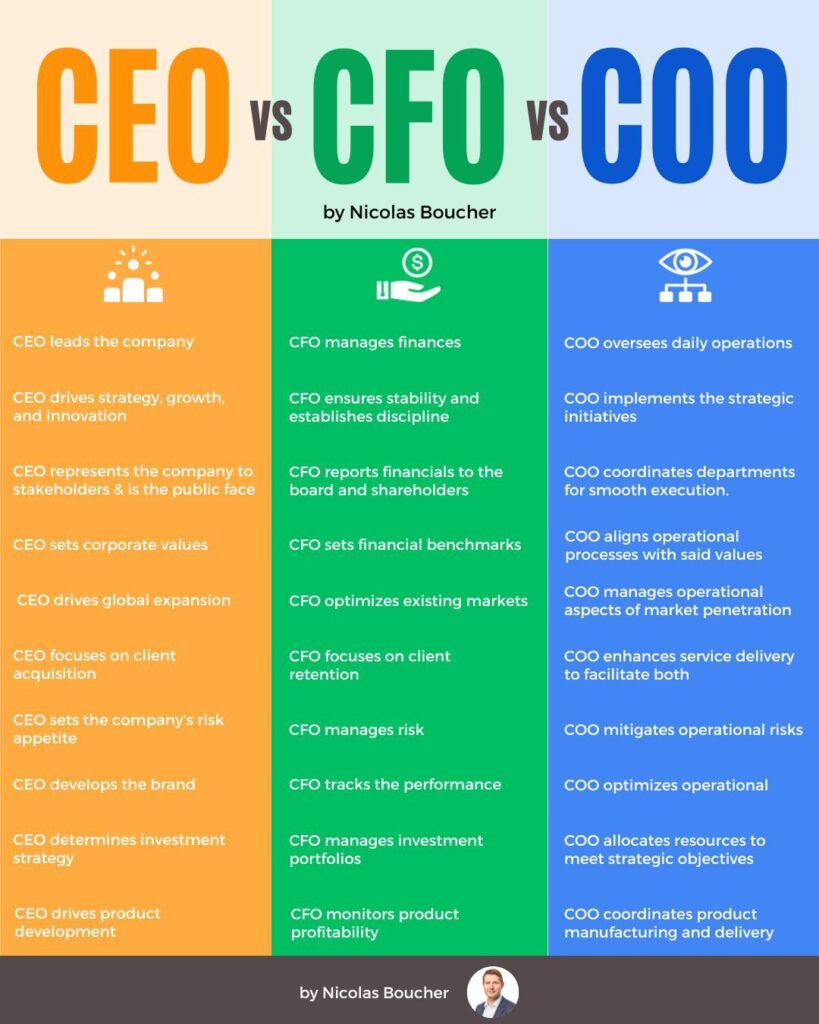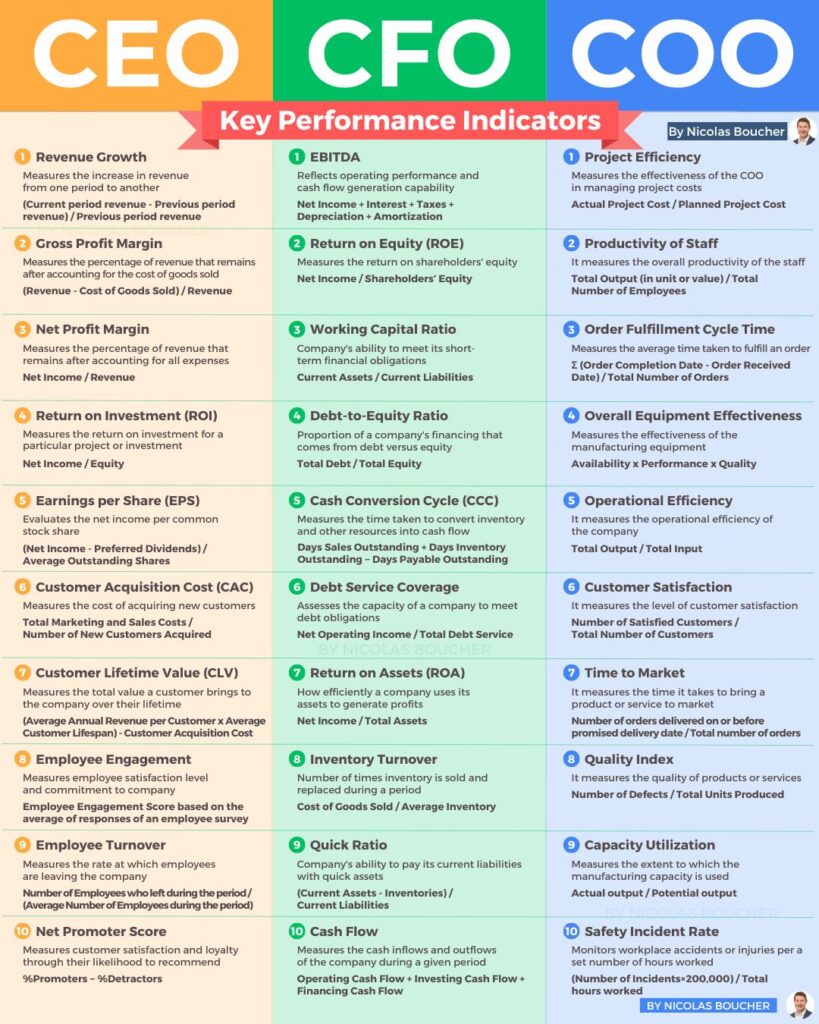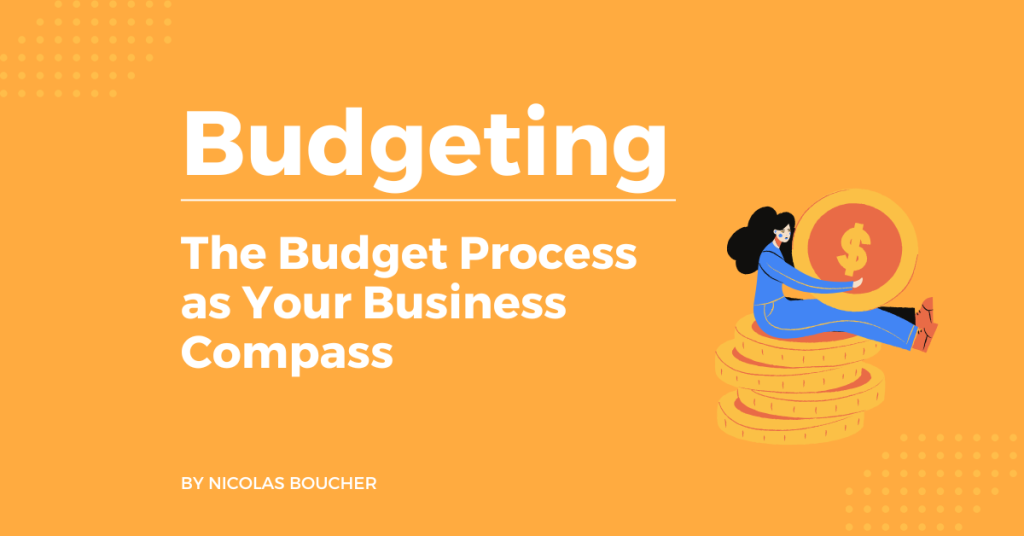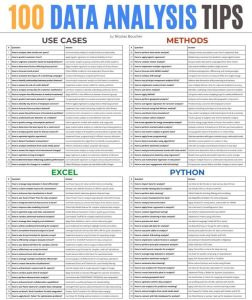Do you know what are the differences in their roles?
Knowing what the management does is going to help you in your career.
CEO, CFO, and COO are the most essential roles in each company.
Let’s discover together what they do.
Table of Contents
Differences between CEO, CFO and COO

1. Their Main Leadership Roles
- CEO leads the company
- CFO manages finances
- COO oversees the day-to-day operations
2. On Strategic Vision
- CEO drives strategy, growth, and innovation
- CFO ensures stability and establishes discipline
- COO implements the strategic initiatives
3. What Are Their Stakeholder Relations?
- CEO represents the company to stakeholders and is the public face
- CFO reports financials to the board and shareholders
- COO liaises between different departments to ensure smooth execution
4. Their impact on the Company’s Values & Benchmarks
- CEO sets corporate values
- CFO sets financial benchmarks
- COO ensures operational processes align with these values
5. Their Role in the Market Strategy
- CEO drives global expansion
- CFO optimizes existing markets
- COO manages operational aspects of market penetration
6. What is their Client Focus?
- CEO focuses on client acquisition
- CFO focuses on client retention
- COO enhances service delivery to facilitate both
7. Their Involvement with Risk Management
- CEO sets the company’s risk appetite
- CFO manages risk
- COO mitigates operational risks
8. Their Relation to the Brand
- CEO develops the brand
- CFO tracks the performance
- COO optimizes operational efficiency to uphold the brand promise
9. Their Role in Investments
- CEO determines investment strategy
- CFO manages investment portfolios
- COO allocates resources to meet strategic objectives.
10. Their Involvement in the Product Lifecycle
- CEO drives product development
- CFO monitors product profitability
- COO coordinates product manufacturing and delivery
Real-Life Examples of How CEO vs CFO vs COO Work Together
Understanding the CEO vs CFO vs COO relationship is more than just knowing job titles.
It’s about seeing how their collaboration directly impacts day-to-day business results.
Here are four practical examples that show exactly how they work together and why it matters.
#1: Deciding Whether to Open a New Office
A company’s thinking about opening a new regional office.
-
The CEO wants to expand market presence and bring the brand closer to customers.
-
The CFO runs the numbers: upfront investment, rent, hiring costs, and when (or if) it pays off.
-
The COO checks if current operations can handle the expansion—can logistics, systems, and teams scale without breaking?
Together, they decided not to open the office right away but instead tested the market with remote hires and partnerships first.
A clear CEO vs CFO vs COO example of reducing risk while still pushing forward.
#2: Investing in a New Product Feature
A new feature idea comes from customer feedback.
-
The CEO likes it—it aligns with the company’s long-term vision.
-
The CFO estimates the cost of building and maintaining it and whether it will increase customer lifetime value.
-
The COO talks to the product and support teams to understand how it will impact workflows and delivery timelines.
They greenlight the feature but agree to pilot it with only 10% of users. This CEO vs CFO vs COO alignment lets them move fast—without wasting resources.
#3: Fixing a Drop in Customer Retention
Customer churn is rising.
-
The CEO pushes for improved onboarding and customer success messaging.
-
The CFO analyzes the revenue lost from churned accounts and how much to reinvest to fix it.
-
The COO looks at internal bottlenecks—support delays, onboarding steps, or product bugs.
They launch a new retention strategy combining better training, proactive support, and usage data tracking.
This hands-on CEO vs CFO vs COO collaboration turns a red flag into a growth lever.
#4: Preparing for a Major Client Pitch
A high-stakes client pitch is coming up.
-
The CEO leads with a vision of what the partnership could look like in 3 years.
-
The CFO tailors the pricing model and ensures the deal is profitable long-term.
-
The COO maps out exactly how the client will be onboarded and supported if they say yes.
Because of this tight CEO vs CFO vs COO prep, the pitch hits all angles—aspiration, financial logic, and execution clarity. They win the deal.
These examples show one thing clearly: when the CEO vs CFO vs COO relationship is strong and practical, businesses make smarter, faster decisions—and avoid costly mistakes.
CEO vs CFO vs COO KPIs
Here’s a quick breakdown of the key metrics for CEOs, CFOs, and COOs:

CEO KPIs
1. Revenue Growth
Formula: (Current period revenue – Previous period revenue) / Previous period revenue
2. Gross Profit Margin
Formula: (Revenue – Cost of Goods Sold) / Revenue
3. Net Profit Margin
Formula: Net Income / Revenue
4. Return on Investment (ROI)
Formula: Net Income / Investment Cost
5. Earnings per Share (EPS)
Formula: (Net Income – Preferred Dividends) / Average Outstanding Shares
6. Customer Acquisition Cost (CAC)
Formula: (Marketing + Sales Costs) / New Customers Acquired
7. Customer Lifetime Value (CLV)
Formula: (Average Revenue per Customer × Average Customer Lifespan) / CAC
8. Employee Engagement
Formula: Measures employee satisfaction and engagement using surveys or performance reviews
9. Employee Turnover
Formula: Number of Employees Who Left During the Period / Average Number of Employees
10. Net Promoter Score (NPS)
Formula: % Promoters – % Detractors
CFO KPIs
1. EBITDA
Formula: Net Income + Interest + Taxes + Depreciation + Amortization
2. Return on Equity (ROE)
Formula: Net Income / Shareholders’ Equity
3. Working Capital Ratio
Formula: Formula: Current Assets / Current Liabilities
4. Debt-to-Equity Ratio
Formula: Total Debt / Total Equity
5. Cash Conversion Cycle (CCC)
Formula: Days Sales Outstanding + Days Inventory Outstanding – Days Payable Outstanding
6. Debt Service Coverage Ratio
Formula: Net Operating Income / Total Debt Service
7. Return on Assets (ROA)
Formula: Net Income / Total Assets
8. Inventory Turnover
Formula: Cost of Goods Sold / Average Inventory
9. Quick Ratio
Formula: (Current Assets – Inventories) / Current Liabilities
10. Cash Flow
Operating Cash Flow + Investing Cash Flow + Financing Cash Flow
COO KPIs
1. Project Efficiency
Formula: Actual Project Cost / Planned Project Cost
2. Productivity of Staff
Formula: Total Output (unit or value) / Total Number of Employees
3. Order Fulfillment Cycle Time
Formula: Σ (Order Completion Date – Order Received Date) / Total Number of Orders
4. Overall Equipment Effectiveness (OEE)
Formula: Availability × Performance × Quality
5. Operational Efficiency
Formula: Total Output / Total Input
6. Customer Satisfaction
Formula: Number of Satisfied Customers / Total Number of Customers
7. Time to Market
Formula: Number of Orders Delivered on or Before Promised Delivery Date / Total Number of Orders
8. Quality Index
Formula: Defects / Total Units Produced
9. Capacity Utilization
Formula: Actual Output / Potential Output
10. Safety Incident Rate
Formula: (Number of Incidents × 200,000) / Total Hours Worked
Last Thoughts – CEO vs CFO vs COO
Each of these roles brings unique strengths and perspectives to the organization, driving it toward success in different but complementary ways.
The CEO leads with a vision for growth and innovation, the CFO ensures financial stability and accountability, and the COO manages the day-to-day operations to ensure that strategic goals are met.
CEO,CFO and COO are equally important to the success of a company, and they contribute in a different way.
FAQ – CEO vs CFO vs COO
Q: What is the primary responsibility of a CEO?
A: The CEO is responsible for leading the company by setting its strategic direction, driving growth, and fostering innovation. They also represent the company to stakeholders and are the public face of the organization.
Q: How does the CFO contribute to the company’s success?
A: The CFO manages the company’s finances, ensuring stability and establishing financial discipline. They report financial performance to the board and shareholders, optimize existing markets, and manage investment portfolios to support strategic objectives.
Q: What does the COO focus on in their role?
A: The COO oversees the day-to-day operations of the company, ensuring that strategic initiatives are implemented effectively. They liaise between departments to facilitate smooth execution, enhance service delivery, and mitigate operational risks.
Q: How do these roles interact with stakeholders?
A: The CEO represents the company to external stakeholders and acts as the public face. The CFO communicates financial performance and stability to the board and shareholders. The COO works internally, ensuring that different departments collaborate effectively to achieve company goals.
Q: What role do these positions play in managing risk?
A: The CEO sets the company’s overall risk appetite, determining how much risk the company is willing to take on to achieve its goals. The CFO manages financial risks, ensuring that the company’s financial health is safeguarded. The COO focuses on mitigating operational risks to ensure smooth and efficient processes.















